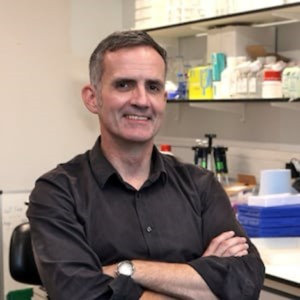In memory of Stephen Ben Walsh
Professor Stephen Benedict Walsh, known to most of us as Ben, died on 30th September, aged 53. He was an extraordinary man, who did not disclose his illness, so that he could keep working productively and effectively with his academic team.

Ben was born and raised in Shrewsbury, attending The Priory School and Shrewsbury Sixth Form College before going on to study medicine at St Georges Hospital Medical School in London.
From the early days at medical school, it was clear that Ben was totally unique amongst us. He was not up for conforming to the generally accepted social, political, musical or behavioural norms. He was dispassionately honest, incredibly quick witted, disarmingly charming and always utterly captivating company. Not surprisingly, he had many friends. He had a way of thinking that was much more creative, less constrained perhaps, than most of his scientific associates and colleagues. He was absolutely dedicated to this artful science and determined to make his mark academically.
He navigated higher medical training in Nephrology across North London and undertook his PhD studies at the Laboratoire de Membrane Cellulaire at the Universite de Nice, France. His research portfolio was as niche as the man himself, providing insights into the fundamentals of kidney transport mechanisms in electrolyte homeostasis and blood pressure regulation.
He became a Senior Lecturer and then Associate Professor in Experimental Medicine and Nephrology at UCL and Honorary Consultant at the Royal Free Hospital. His main clinical interest was renal tubular disease. He ran the UCL Tubular Clinic which has the UK’s largest cohorts of patients with rare, well-phenotyped renal tubular disorders such as Gordon syndrome (hypertension), and Gitelman syndrome (hypotension). He established an international reputation as an expert in these rare disorders, but he also applied the rare to the common, recognising that these tubulopathies gave insights into regulation of blood pressure. He became a founding member of UCL Hypertension Service and set up the Complex Hypertension Clinic as well as one of the first virtual hypertension clinics at the Royal Free Hospital. He was later appointed as Professor in Experimental Medicine and Nephrology at UCL and gave his inaugural lecture in May 2024.
His observations led him to determine that the hypertension and electrolyte abnormalities that occur in kidney transplant patients treated with calcineurin inhibitors mimicked the rare monogenic tubular disorder, Familial Hyperkalaemic Hypertension, caused by overactivation of the sodium transporter SLC12A3. His work confirmed that calcineurin inhibitors activate SLC12A3 to cause hypertension, by upstream activation of the WNK kinase cascade, implicating calcineurin in this pathway for the first time, published in Nature Medicine 2011.
Ben then went on to secure research funding from many blood pressure and kidney organisations to further explore the role of SLC12A3 and other transporters in blood pressure regulation, salt handling and immunity, leading to further Nature as well many other publications.
He was joined by Dr Keith Siew, a post-doctoral Sir Henry Wellcome Fellow and Early Career Researcher in 2019. This brought a different level of 3-dimensional imaging to compliment the human centred interest of his research group. I recall one of their PhD students gaining the most prestigious young investigator award at the British and Irish Hypertension Society (BIHS) annual scientific meeting for presenting work on renal cell lines cultured in 3-dimensions in an organ on a chip (OoC) model.
His most recent research with Keith, was possibly the most Stephen Benedict Walsh collaboration imaginable: with NASA, to examine the effect of microgravity and galactic cosmic radiation on kidney function and solute transport, via 3-D imaging and proteomic/transcriptomic/metabolomic analysis of rodent tissue from the International Space Station and the Brookhaven GCR simulator. This work received successful project grant funding from the UKRI via the UK Space Agency and has already generated further Nature and other publications.
Ben was a long-standing working member of the BIHS, having served 3 years on the Society Executive Committee until 2021 and many other years on the guidelines working group. He contributed to several of the BIHS guidelines and commentaries and gave several quite brilliant and inspiring talks at the annual meetings.
Ben is going to be missed by so many people, his friends and colleagues and collaborators, of whom there were so many. His patients, students and trainees, who thought the world of him – the inimitable way he managed to bring the kidney tubule to life in teaching sessions..
The kidney and blood pressure clinical and scientific community have lost a truly unique and stellar colleague.
His partner Chiara and their five-year-old son Silas, who live in South London, as well as his mum and sister Kate in Shropshire, will of course miss him more than words are able to convey.
A fundraiser has been set up in Professor Walsh’s memory to raise money for UCL’s Centre for Kidney and Bladder Health. The money will be used to find a way to honour the professor and his clinical and academic achievement.
To donate, visit justgiving.com/page/in-memory-of-prof-ben-walsh

